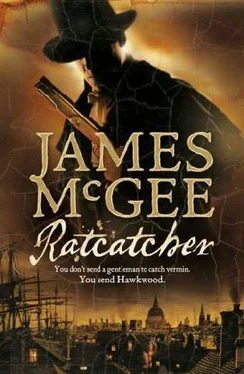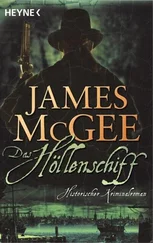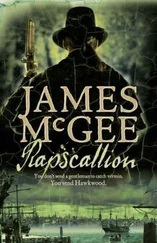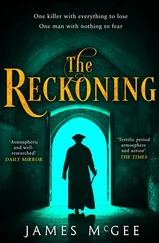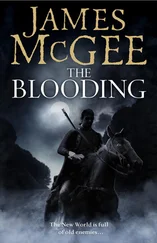James McGee - Ratcatcher
Здесь есть возможность читать онлайн «James McGee - Ratcatcher» — ознакомительный отрывок электронной книги совершенно бесплатно, а после прочтения отрывка купить полную версию. В некоторых случаях можно слушать аудио, скачать через торрент в формате fb2 и присутствует краткое содержание. Жанр: Исторический детектив, на английском языке. Описание произведения, (предисловие) а так же отзывы посетителей доступны на портале библиотеки ЛибКат.
- Название:Ratcatcher
- Автор:
- Жанр:
- Год:неизвестен
- ISBN:нет данных
- Рейтинг книги:4 / 5. Голосов: 1
-
Избранное:Добавить в избранное
- Отзывы:
-
Ваша оценка:
- 80
- 1
- 2
- 3
- 4
- 5
Ratcatcher: краткое содержание, описание и аннотация
Предлагаем к чтению аннотацию, описание, краткое содержание или предисловие (зависит от того, что написал сам автор книги «Ratcatcher»). Если вы не нашли необходимую информацию о книге — напишите в комментариях, мы постараемся отыскать её.
Ratcatcher — читать онлайн ознакомительный отрывок
Ниже представлен текст книги, разбитый по страницам. Система сохранения места последней прочитанной страницы, позволяет с удобством читать онлайн бесплатно книгу «Ratcatcher», без необходимости каждый раз заново искать на чём Вы остановились. Поставьте закладку, и сможете в любой момент перейти на страницу, на которой закончили чтение.
Интервал:
Закладка:
Senses reeling, Jago took another, longer look at the occupants of the officer’s gig. What was it about the uniforms that had caught his eye? True, they weren’t the smartest he’d ever seen; decidedly scruffy, in fact, considering the occasion. If Jago didn’t know any better, he’d have said the state of the uniforms was more reminiscent of a slop chest’s contents than of a newly commissioned crew set to join a brand-new man-of-war.
And then it hit him like a bolt of lightning. He spun, taking it all in: the ship, the men on board her, the activity on the dockside, the presence of the marines, and the words that had been bandied in jest by the men in the boats.
“Mother of God!” Jago said in awe. He looked at James Read with horror on his face. “You’re mad! It’ll never bloody work!”
William Lee stroked his jaw tenderly, feeling the bristly beginnings of his new stubble, and a welcome sense of pleasure moved through him. He had missed the feel of a beard. He had worn one for the last ten years or so and felt naked without it. Now that his mission was coming to an end, with the necessity for disguise no longer paramount-it would have been unusual for a French aristocrat to have been so hirsute, Lord Mandrake had advised him-he was looking forward to the beard’s return. It would be like greeting the appearance of a long-lost friend.
Lee took his hand from his chin and prepared to deploy the Narwhale’ s eye.
It was an invention of his own, independent of Fulton’s design, and necessitated by a fundamental flaw in the operation of the submersible. In order to keep its target under constant observation, the vessel had to keep breaking the surface, which inevitably increased the risk of the dome being spotted. The obvious key to the problem, Lee had reasoned, lay in providing a means by which the commander could keep the target in sight while remaining submerged. The solution, after much trial and error, had been simple and ingenious: a two-inch diameter sealed metal tube with a reflecting mirror set into each end. The surface of the mirrors ran parallel to each other at a 45-degree angle to the axis of the tube. Opposite each mirror, set into the side of the tube, was a small inlay of glass. Looking through either glass into the adjacent mirror one could see a reflection from the mirror at the other end of the tube.
Lee had sunk the device into the roof of the tower. Seated beneath the dome, the commander of the vessel could raise or lower the tube at will. With the vessel submerged and the tube raised, the commander, by looking into the bottom mirror, could see what was reflected in the top mirror, above the surface of the water.
Through experimentation, he had settled on twenty-six inches as the optimum length of the eye tube. Any longer and the image relayed back from the surface was severely distorted and too small to be of any use. Taking further inspiration from a spyglass, Lee had attempted to incorporate a series of lenses between the mirrors in an effort to magnify the image, but so far he had not been successful.
Lee raised the eye and wiped a tear of moisture from the rim. The device, though effective, had its drawbacks. The sealant-a concoction of pig grease and wax-had a tendency to leak over prolonged periods. Once water had seeped inside the tube, the mirrors would mist over with condensation. Lee hadn’t yet managed to solve that problem. He’d tried various methods of prevention and, although each successive attempt had been an improvement, he was still some way from devising a foolproof, not to say waterproof, solution. But for the time being it would suffice. At a distance of eighty yards from the target, the eye enabled him to observe the ship in close proximity. He could even see the name board at her stern. Lines were being hauled on board and made fast. The fleet of support craft was dispersing. Through the glass he could see the bunting and the flags in fine detail. He searched and picked out the one that marked his target: the standard of the Prince of Wales. It meant the Regent was on board, probably among that group of men at the stern, he reasoned.
“Closer, Mr Sparrow, if you please.”
The hull of the ship rose broad and sheer out of the water like the side of a cliff.
Lee lowered the eye. He discovered that his mouth was as dry as sand.
He looked at his watch. It was time.
“Take her down easy, Mr Sparrow. Gently does it.”
Lee adjusted the rudders. Narwhale crept forward.
Hawkwood pulled impotently at the bonds securing his wrists. There was some give in the rope, but not nearly enough. He glanced towards Sparrow. The seaman’s scarred back was towards him. Carefully, Hawkwood eased himself into a sitting position and drew his knees towards his chest.
“Rest easy, Mr Sparrow. We’re almost there.” Lee’s voice was a hoarse whisper.
Sparrow stopped turning the crank. Lee’s hands continued to move gently on the rudder controls, relying on the submersible’s momentum to carry them forward. Slowly, a dark shape moved across one of the windows. One by one, the tiny slivers of light illuminating the interior of the hull were extinguished as the Narwhale slid beneath the warship’s great hull.
A chill ran down Hawkwood’s spine. Was it his imagination, or had it become colder inside the darkened compartment? He heard the strike of a flint. A pale, spluttering orange glow told him that Lee had lit the lantern.
There was a bump, followed by a scraping sound. Hawkwood realized what it was. The top of the sub-mersible’s tower had made contact with the bottom of the warship’s hull.
It was Lee’s signal.
Suspending the lantern from a rib in the roof, Lee worked quickly. He didn’t have much time. Thetis would be underway within minutes. It would be impossible to drive the spike into the warship’s hull while the vessel was in motion. Lee lifted two items from hooks on the bulkhead. One was a small iron maul. The other was a thin, rounded T-shaped piece of metal. The stem of the T was threaded and resembled an auger. Lee lifted his head and probed the roof of the tower with his fingertips for the hollowed base of the Narwhale ’s horn. Using his left hand for support he screwed the auger into the end of the horn. Ensuring that the join was tight, he reached for the maul.
It took four firm strikes with the maul to drive the barbed tip of the horn into the ship’s hull. Satisfied that the horn was firmly embedded, Lee reached up and unscrewed the auger from the shaft. From his pocket he removed a small wax plug and, using the maul, tapped it into the end of the shaft to seal it. Satisfied that there was no seepage, he resumed his seat.
Hawkwood was astonished at the ease and speed of the operation. It had taken less than a minute to attach the horn to the belly of the ship.
“Stand by, Mr Sparrow.” Lee leaned forward and released the lock on the forward windlass. “Now, take us down and out, if you please.”
Sparrow began to crank. Slowly, painfully, inch by cautious inch, the Narwhale began to nose forward. The click of the windlass could be clearly heard as the line running from the winch through the cleft in the horn to the torpedo at the stern of the submersible was reeled out. As the vessel emerged from beneath the shadow of the warship’s hull, light from the surface began to filter into the compartment once more and Lee extinguished the lantern.
It was in those few seconds, between the snuffing out of the lantern and the ingress of natural light, that Hawkwood was finally able to reach down, tendons stretched to breaking point, and remove the knife from the inside of his right boot.
Hawkwood had no idea how much time he had before the torpedo was set to explode. The count down to detonation was dependent on the length of the trigger line, and that, he suspected, given the diameter of the windlass, wouldn’t be long. And while he was sitting there thinking about it, vital seconds were ticking away. With Lee and Sparrow preoccupied with making good the Narwhale ’s escape, he knew it was the only chance he had left. Reversing the knife and gripping the shaft precariously in his left hand, Hawkwood began to saw at his bonds.
Читать дальшеИнтервал:
Закладка:
Похожие книги на «Ratcatcher»
Представляем Вашему вниманию похожие книги на «Ratcatcher» списком для выбора. Мы отобрали схожую по названию и смыслу литературу в надежде предоставить читателям больше вариантов отыскать новые, интересные, ещё непрочитанные произведения.
Обсуждение, отзывы о книге «Ratcatcher» и просто собственные мнения читателей. Оставьте ваши комментарии, напишите, что Вы думаете о произведении, его смысле или главных героях. Укажите что конкретно понравилось, а что нет, и почему Вы так считаете.
